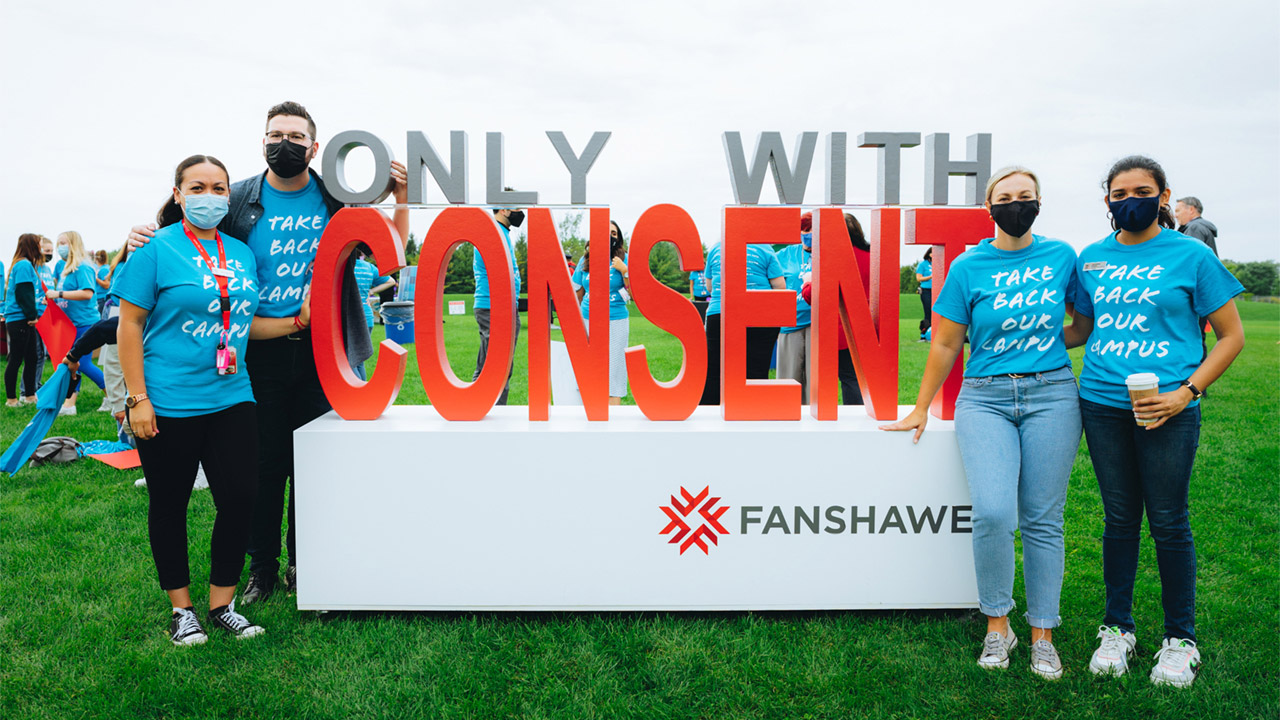FSU presidents: 1999 meets 2022
 CREDIT: BRENDAN BEAMISH
CREDIT: BRENDAN BEAMISHFSU president Ricardo Souza poses with Karen Martinez, Tanushree Prasad and Leah Marshall at a walkout against sexual violence.
A lot can change in 23 years.
The Fanshawe Student Union (FSU) undertakes the commitment for enhancing student experience during their time at Fanshawe. From learning about the various resources offered to students from students to helping you participate with events and activities organized by the college or the FSU; the FSU is responsible for communicating all these matters to the student body.
Specifically, the FSU president’s role is to provide a vision for every individual at the college along with directing other leaders on the council with planning and organizing programs and services.
During this past year, current FSU president, Ricardo Souza, dealt with several issues in the community that had a major impact on his presidency. To begin with, Souza’s presidency began in May 2021, during the COVID-19 pandemic.
Souza expressed his experience as a president during the lockdown, when most students had shifted to remote learning and were off-campus.
“The first lockdown happened in 2020, I was [an FSU] coordinator,” said Souza. “We were at the beginning of the pandemic, and we were all transitioning to the online format, so I was able to grasp a little bit on how people were doing things. So, once I became the president, I think it was a little bit easier because I was used to this kind of environment.”
He further indicated that the pandemic allowed him to bring forth more focus on mental health issues for students during his presidency.
“But mental health was a long run still because we were seeing all the facts in the next year, when everything was kind of happening and people didn’t realize the effect the pandemic was having on everyone’s mental health. So, this year, we realized that we could do a little bit better, you could see more the outcomes and effects of the pandemic. So that’s why one of our main pillars is mental health, because we are working closely with counselling services and mental health departments within the college. We are also supporting students with our advocacy services and many other services like awareness campaigns, so on and so forth,” added Souza.
Souza felt that there were some challenges with communication due to the absence of students on campus, especially as the topics of diversity, racism, and sexual violence came to the forefront in 2021.
“It’s been hard. Online platforms are the only way we have to connect to our students as of now. I think the sense of belonging and sense of community is a bit lost in the middle of all this. Because, when are you are not in person, you can feel the difference,” said Souza.
Souza and the team had social media on their side to help connect with students during the pandemic. But what if went back in time to 1999? How did the FSU connect with students then, and what was going on in the world? Former FSU president from 1999-2000, Jason Kerr said during the time of his presidency, there were some questions of diversity, but the main issues amongst the student body pertained to Ontario Student Assistance Program (OSAP), health plans, and bus passes.
“There were always issues around OSAP or loan forgiveness, and those things are still a thing. Negotiations on health care plans and coverages as well. And, in the fall of ‘99, was the first bus pass distribution, as well as the first residence, Van Jones, so those were a couple of big things,” said Kerr.
During his presidency, Kerr mainly dealt with organizational work pertaining to student plans, parking, and residences as opposed to specific issues felt by the student body.
“It was hard,” said Kerr. “I think people understand now what the student union or student associations in general do, but back then, it was really hard, people thought it was entertainment, they thought you were putting on politics.”
Together, both Souza and Kerr advised any future presidents to understand the importance of presidency in a student association.
“It’s very important to be available, you’re the spokesperson for the student body,” said Kerr. “You need to be around and present. You need to work and develop…create your own relationships with college administrators.”
















